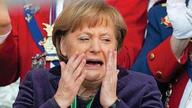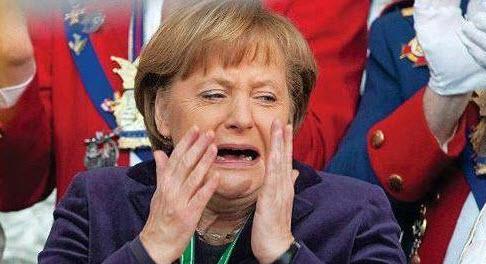Results 1 to 1 of 1
Thread Information
Users Browsing this Thread
There are currently 1 users browsing this thread. (0 members and 1 guests)
-
07-02-2019, 10:29 AM #1
In Unprecedented Blow To Lame Duck Merkel, Partners Reject "Half Baked" Socialist For
In Unprecedented Blow To Lame Duck Merkel, Partners Reject "Half Baked" Socialist For Top EU Job

How the mighty have fallen.
Tue, 07/02/2019 - 01:00
2 SHARES
Negotiations between President Trump and President Xi drew the lion's share of the market's attention over the weekend, as the two world leaders reenacted their 'truce' from the prior G-20 summit, giving global equity markets the optimistic trade headlines they crave (In the US, stocks started the month at record highs).
Moving over to Europe, Boris Johnson's quest to succeed Theresa May as the next occupant of No. 10 Downing Street has sopped up most of the political bandwidth. But though it didn't garner quite as much attention, the first cracks in the facade of the center-right bloc that has controlled the EU for decades formed over the weekend as German Chancellor Angela Merkel failed to win a consensus for her pick to succeed Jean-Claude Juncker as the next head of the European Commission.
 As we explained back in May, Europe's populist parties banked their strongest showing yet in last month's EU Parliamentary vote - though readers wouldn't know that if they simply absorbed their news from left-leaning outlets like the BBC and the Guardian, which tried to spin the results as a critical victory. Though the center-right coalition known as the EPP and center-left coalition S&D lost their combined majority in the Parliament, they retained a plurality of votes, while populist parties like Nigel Farage's Brexit Party and Italy's League made strong gains. Though establishment voices still outnumber populists, the blow dealt to the establishment's coalition, we noted at the time, would make selecting the replacements for Juncker, ECB President Mario Draghi, and other senior bloc-level positions (most of which are filled via backroom wheeling and dealing, not by the voters themselves).
As we explained back in May, Europe's populist parties banked their strongest showing yet in last month's EU Parliamentary vote - though readers wouldn't know that if they simply absorbed their news from left-leaning outlets like the BBC and the Guardian, which tried to spin the results as a critical victory. Though the center-right coalition known as the EPP and center-left coalition S&D lost their combined majority in the Parliament, they retained a plurality of votes, while populist parties like Nigel Farage's Brexit Party and Italy's League made strong gains. Though establishment voices still outnumber populists, the blow dealt to the establishment's coalition, we noted at the time, would make selecting the replacements for Juncker, ECB President Mario Draghi, and other senior bloc-level positions (most of which are filled via backroom wheeling and dealing, not by the voters themselves).
The new parliament's term hasn't even started yet, and already, Merkel has proven that she's a lame duck (even after her latest attempt at "un-retirement") who can't be relied upon to secure the coronation of her coalition's next round of picks. According to Bloomberg, after a marathon post-Osaka session in Brussels, Merkel failed to anoint Socialist Frans Timmermans the next chairman of the European Commission as her made-in-Osaka plan faced unprecedented backlash in Brussels.
One official quoted by BBG called the unexpected pushback to Merkel's plan - which came both from her coalition partners as well as 'smaller countries' who took umbrage in the fact that they were excluded from a deal cooked up in Osaka - a "rebellion of rabbits."If there was one thing Angela Merkel didn’t factor into her plan to make Socialist Frans Timmermans the European Union’s next chief executive, it was what one official in the room called the "rebellion of rabbits."As dawn approached on Monday morning, Merkel was forced to hold one-on-one meetings with national leaders. And still, no deal materialized. Here's how Bloomberg explained it.
As she flew back from the G-20 in Japan, the German chancellor and veteran of many an EU marathon summit was fairly confident that the 58-year-old Dutchman would be accepted by the rest of the leaders gathering in Brussels to decide who to put forward as the next head of the European Commission.
Sure, it was going to be a long night, but she’s faced down worse. As the sun rose, there was no deal and shortly after noon it was decided to reconvene on Tuesday at 11 a.m. after almost 19 hours of going around in circles. It was something almost without precedent.
What became clear was that Merkel had miscalculated the degree of opposition on two fronts: from her own center-right political family that felt betrayed she gave away the top prize. And also the smaller countries that often feel unseen and bared their teeth at the what felt like a stitch-up cooked up in Osaka.
For starters, the stage hadn’t been properly set. Deals and assurances weren’t put in place. Young powers smelled blood and growing intolerance for backroom deals - especially in an increasingly fragmented political landscape following May’s EU elections.For Merkel, one year ago, this type of snub would have been unthinkable. But now that she has stepped down as party leader and set an end date for her historic chancellorship, the new blood in Europe is trying to make its voice heard.
But it wasn't just the young bloods like Italy's Giuseppe Conte who opposed Merkel's deal...Italian Prime Minister Giuseppe Conte said he objected to a package of nominations that was formulated outside Brussels without consulting all members states: "If I sit here, I need the proposal to be made by components of the EU Council, I want the proposal to be discussed here, to be motivated here and to be confronted here."...Even longtime allies like Emmanuel Macron refused to come to her rescue.
It may not have been of Merkel’s making, and she may have endorsed it only in the spirit of compromise, but the fierce opposition to the plan erodes the chancellor’s grip and authority -- even if an accord is reached. Talks have now gone on longer than the 2015 Greek crunch meeting when she was at height of her power.
And French President Emmanuel Macron was not coming to her rescue - their relationship has been showing signs of strain. "In the long run we must draw consequences of such a failure," he said at the end of day two. "Our credibility is deeply stained by these endless meetings that lead to nothing. We’re giving an image of Europe that is not serious."Perhaps the Prime Ministerof Bulgaria best articulated the frustration of the EPP's smaller coalition partners: "Nobody has the right to negotiate on our behalf, from EPP, whatever post they have." Another described Merkel's plan to anoint Timmermans as "half baked".
Others lashed out at the chancellor, saying the impasse is a sign of how much of a lame duck she is. There was no plan to come up with a proposal that her own people, lawmakers at the EU parliament and other center-right leaders were going to shoot down in such an insulting manner.Markets might not be paying attention now (the BBG headlines went largely unnoticed), but as talks over ECB President Mario Draghi's replacement falter, we imagine that investors will soon be paying attention to the new era of political gridlock looming over Brussels.
"Merkel is leader of the CDU, not the EPP," Bulgarian Prime Minister Boyko Borissov told reporters. "Well many other things came from Osaka as well. But nobody has the right to negotiate on our behalf, from EPP, whatever post they have."
Such open defiance to Merkel would have been unthinkable even a year ago. Today she appears a weakened figure, both at home and internationally, with her term ending in 2021.
https://www.zerohedge.com/news/2019-...ist-top-eu-jobIf you're gonna fight, fight like you're the third monkey on the ramp to Noah's Ark... and brother its starting to rain. Join our efforts to Secure America's Borders and End Illegal Immigration by Joining ALIPAC's E-Mail Alerts network (CLICK HERE)
Similar Threads
-
Lame Duck Gone Wild: Election "Butt Kicking" Unleashes Mad-Duck Obama
By Newmexican in forum General DiscussionReplies: 0Last Post: 12-03-2014, 01:50 PM -
Judge Jeanine Pirro Opening Statement "Duck Dynasty" , A&E & "Duck Justice" 12-21-201
By AirborneSapper7 in forum General DiscussionReplies: 0Last Post: 12-22-2013, 09:35 PM -
Dem Sen. Bennett On Lame Duck Session: "It's All Rigged
By AirborneSapper7 in forum Other Topics News and IssuesReplies: 1Last Post: 11-30-2010, 04:31 PM -
Reject New START in the Lame Duck Session
By kathyet in forum General DiscussionReplies: 1Last Post: 11-22-2010, 02:07 PM -
"Some lame duck"
By timeforchange in forum illegal immigration News Stories & ReportsReplies: 1Last Post: 12-11-2008, 01:20 PM


 LinkBack URL
LinkBack URL About LinkBacks
About LinkBacks




 Reply With Quote
Reply With Quote


Illegal Alien Charged with Sexually Assaulting Two Girls After...
04-23-2024, 05:10 PM in illegal immigration News Stories & Reports